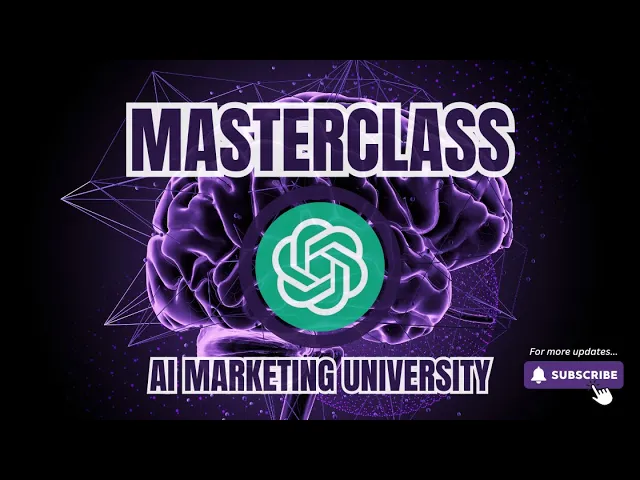ChatGPT Masterclass: AI Survival Guide – AI Marketing University

ChatGPT survival guide every marketer needs
In the rapidly evolving landscape of artificial intelligence, marketers find themselves at a crossroads—adapt to AI tools like ChatGPT or risk falling behind. The recent masterclass on ChatGPT offered by AI Marketing University provides a compelling roadmap for marketers seeking to navigate this new terrain. As someone who's tracked AI developments for years, I was struck by how thoroughly this session demystifies what can often feel like intimidating technology.
The AI revolution is reshaping marketing fundamentals
The masterclass presents several crucial insights that deserve attention:
-
ChatGPT isn't replacing humans—it's augmenting human capabilities. The most successful marketers will be those who learn to collaborate with AI, using it to handle routine tasks while focusing their own energy on strategy and creative direction. This partnership approach yields significantly better results than either working in isolation.
-
Effective prompting is an emerging skillset worth mastering. The difference between mediocre and exceptional AI outputs often comes down to how well you communicate with the system. Learning prompt engineering techniques—being specific, providing context, and using frameworks like the CPED method (Context, Purpose, Examples, Details)—transforms ChatGPT from a novelty into a powerful productivity tool.
-
ChatGPT excels at specific marketing applications that previously consumed disproportionate time. Content ideation, headline generation, email campaign drafting, and social media post creation can now be accomplished in minutes rather than hours, allowing marketers to test more variations and focus on strategic decisions.
-
Understanding AI limitations remains critical. The model can hallucinate facts, lacks real-time information beyond its training data, and sometimes produces generic content that requires human refinement. Responsible use means verifying AI-generated claims and adding your unique expertise to the output.
The democratization of marketing expertise
What strikes me as most significant about ChatGPT is how it democratizes access to marketing expertise. Previously, small businesses and solopreneurs couldn't compete with large agencies' resources and specialized knowledge. Now, a founder with limited marketing background can leverage ChatGPT to generate professional-quality content, develop campaign strategies, and analyze market positioning—all at a fraction of traditional costs.
This shift matters enormously in our current economic climate. As
Recent Videos
How To Earn MONEY With Images (No Bullsh*t)
Smart earnings from your image collection In today's digital economy, passive income streams have become increasingly accessible to creators with various skill sets. A recent YouTube video cuts through the hype to explore legitimate ways photographers, designers, and even casual smartphone users can monetize their image collections. The strategies outlined don't rely on unrealistic promises or complicated schemes—instead, they focus on established marketplaces with proven revenue potential for image creators. Key Points Stock photography platforms like Shutterstock, Adobe Stock, and Getty Images remain viable income sources when you understand their specific requirements and optimize your submissions accordingly. Specialized marketplaces focusing...
Oct 3, 2025New SHAPE SHIFTING AI Robot Is Freaking People Out
Liquid robots will change everything In the quiet labs of Carnegie Mellon University, scientists have created something that feels plucked from science fiction—a magnetic slime robot that can transform between liquid and solid states, slipping through tight spaces before reassembling on the other side. This technology, showcased in a recent YouTube video, represents a significant leap beyond traditional robotics into a realm where machines mimic not just animal movements, but their fundamental physical properties. While the internet might be buzzing with dystopian concerns about "shape-shifting terminators," the reality offers far more promising applications that could revolutionize medicine, rescue operations, and...
Oct 3, 2025How To Do Homeless AI Tiktok Trend (Tiktok Homeless AI Tutorial)
AI homeless trend raises ethical concerns In an era where social media trends evolve faster than we can comprehend them, TikTok's "homeless AI" trend has sparked both creative engagement and serious ethical questions. The trend, which involves using AI to transform ordinary photos into images depicting homelessness, has rapidly gained traction across the platform, with creators eagerly jumping on board to showcase their digital transformations. While the technical process is relatively straightforward, the implications of digitally "becoming homeless" for entertainment deserve careful consideration. The video tutorial provides a step-by-step guide on creating these AI-generated images, explaining how users can transform...
